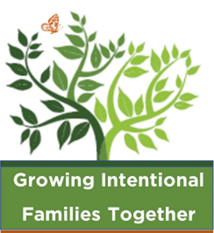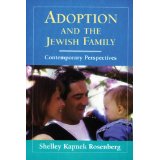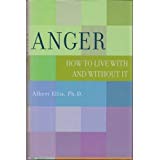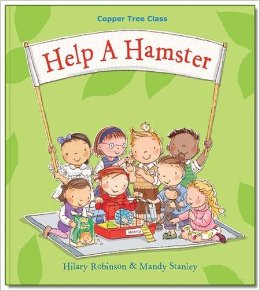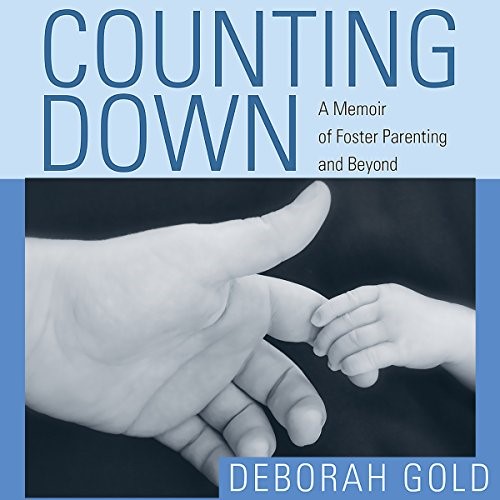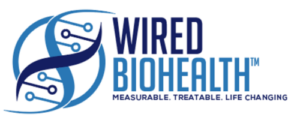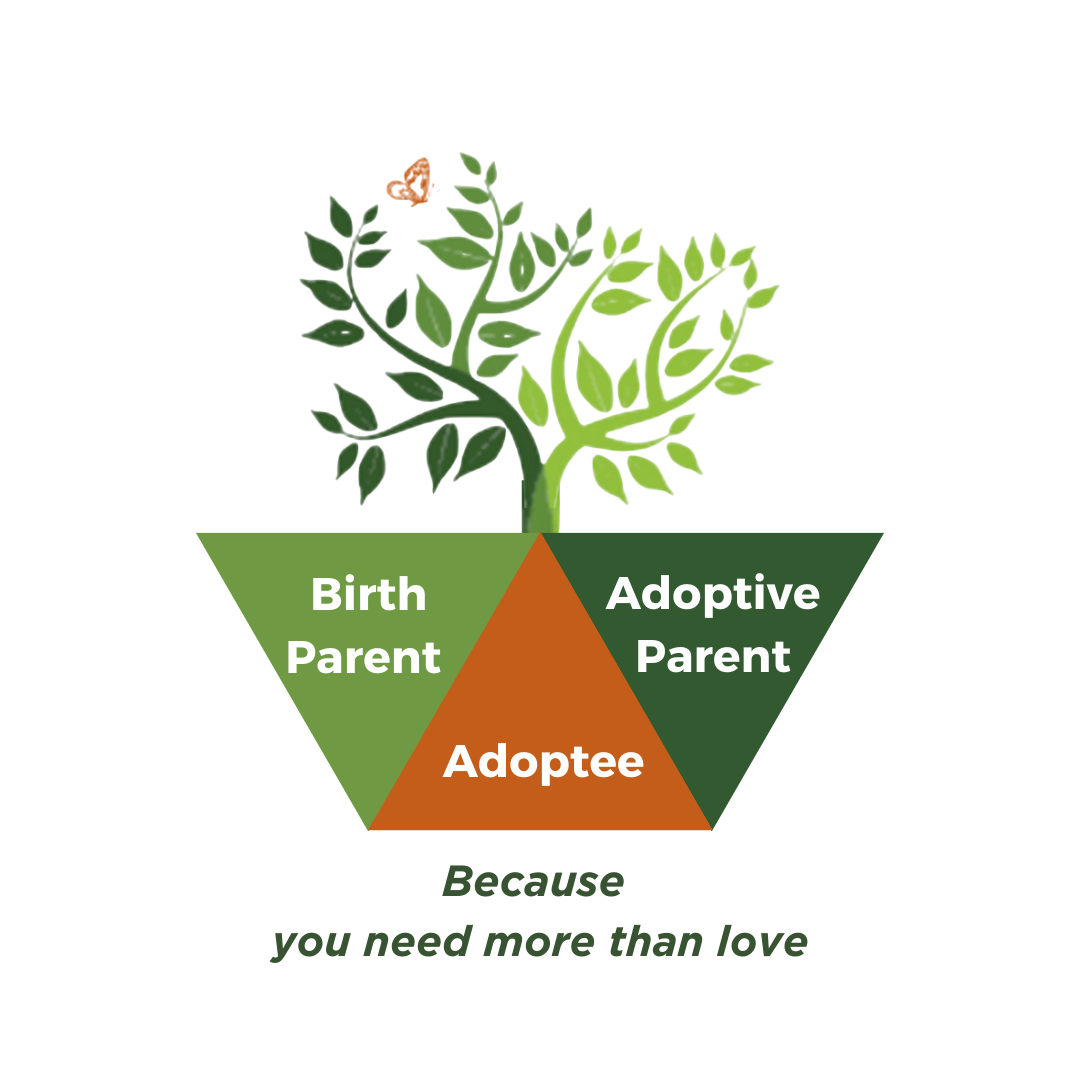GROWING INTENTIONAL FAMILIES TOGETHER, LLC
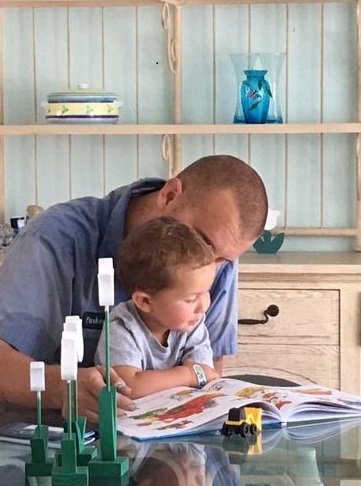
Suggested Articles & Books
Informative and helpful articles about adoption
Articles
- Support for Adoptive Parents: Know Your Options
- What to Expect From An Adoption Coach
- Creating an Adoption Plan With Your Adoption Coach
- Pre-Adoption: The Big Questions to Ask and Answer
- Support for Adopted Children: Know Your Options
Our Featured Posts on Adopting.com
- Understanding the Need for Positive Adoption Language,
- Moving Beyond “Color Blind” Parenting to Value The Human Rainbow,
Our Featured Posts for Americaadopts.com
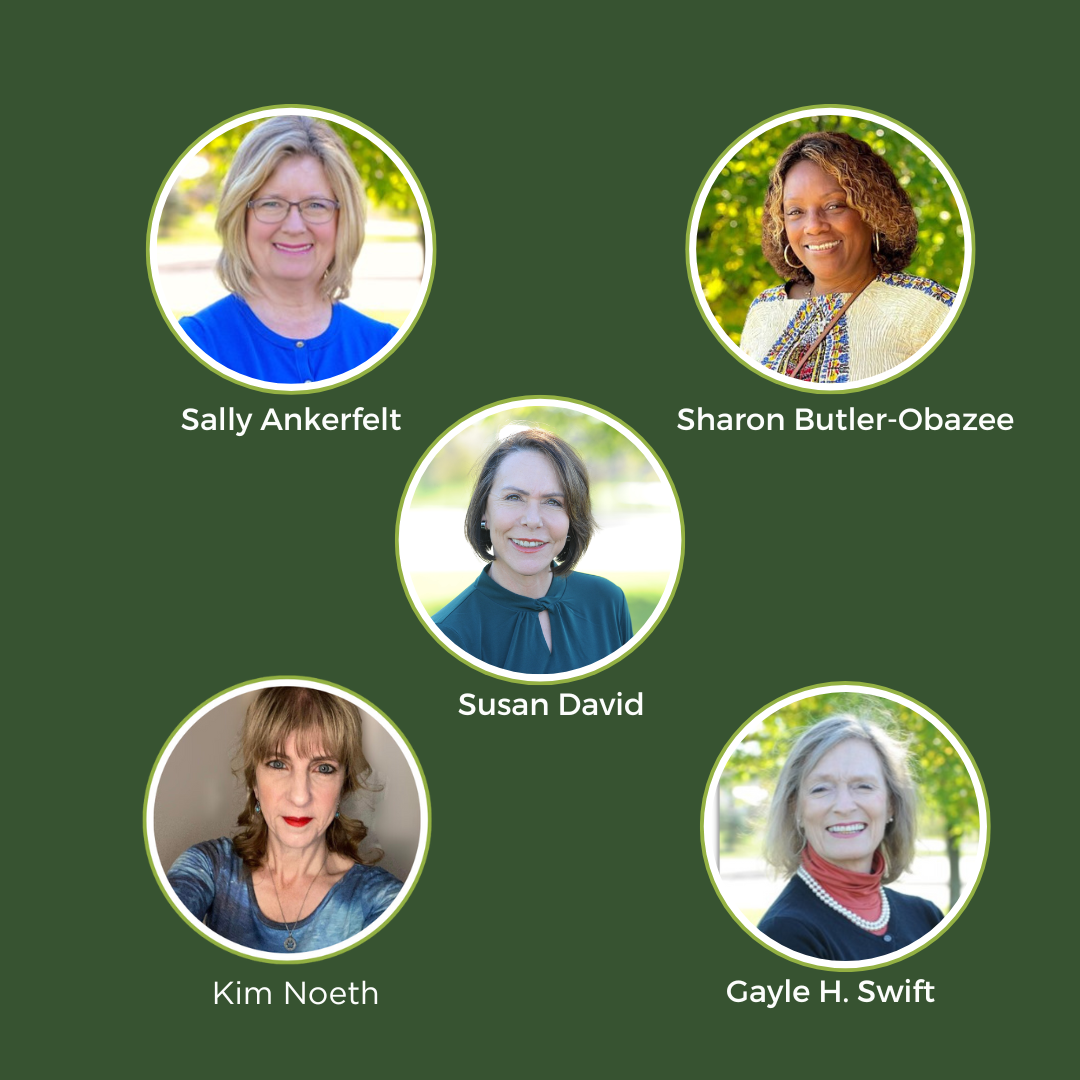
Books Written by Growing Intentional families Together Coaches
Reimagining Adoption: What Adoptees Seek from Families and Faith by Sally Ankerfelt, M. Div., and Gayle H. Swift, CPC. This book aligns personal experience, trauma research, expert insights, and adoptee interviews into adoption-attuned strategies that support adoptees and their families. They infuse this knowledge into a reimagining of adoption practice inside and outside the church.
The book is intended for anyone who is interested in understanding adoption through the lens of faith as well as how congregations can grow in support of adoptees and their families. Adoptee interviews form the basis of the book. They revealed how their faith has been challenged because of what people in their congregations and some family members have told them. Reimagining Adoption is a resource both practical and aspirational. It understands the history as well as the current needs of adoptees and their families.
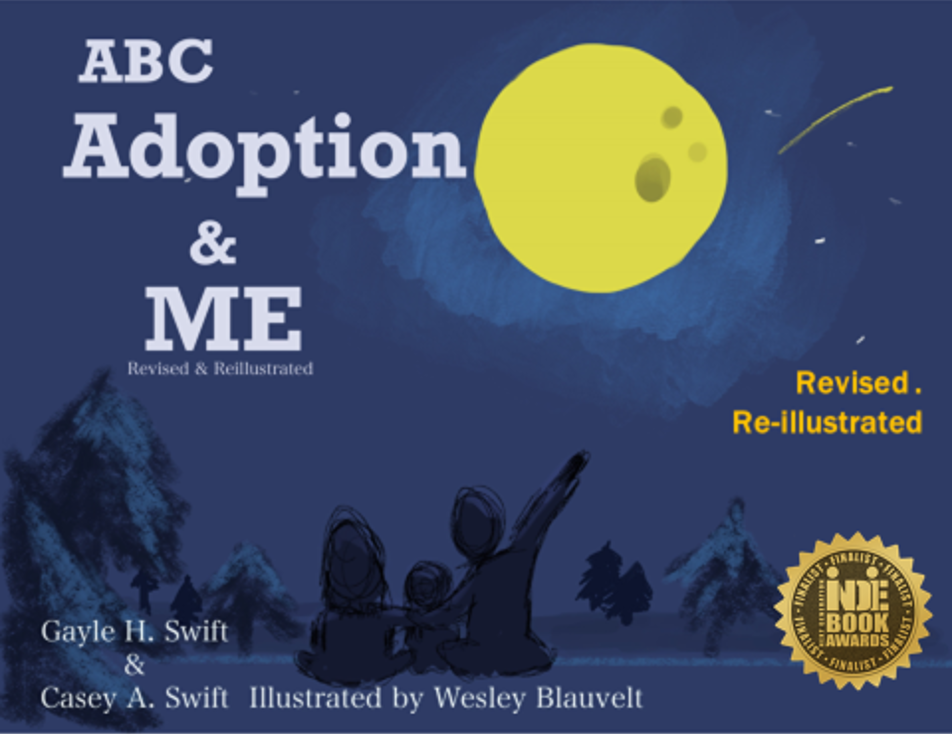 ABC, Adoption & Me (REVISED & REILLUSTRATED The original version of this book launched in 2013. It earned many awards and adoptive families reported that it genuinely helped them explore and discuss adoption with their little children, in a way that kids felt supported and that also deepened their connection. Using the familiar framework of an alphabet book, it introduces a range of adoption-connected concepts, from the very simple such as “B is for bellybutton. Everyone has one.” to “R is for real. My birth parents and my adoptive parents are all real. I’m a real kid and we are a real family.
ABC, Adoption & Me (REVISED & REILLUSTRATED The original version of this book launched in 2013. It earned many awards and adoptive families reported that it genuinely helped them explore and discuss adoption with their little children, in a way that kids felt supported and that also deepened their connection. Using the familiar framework of an alphabet book, it introduces a range of adoption-connected concepts, from the very simple such as “B is for bellybutton. Everyone has one.” to “R is for real. My birth parents and my adoptive parents are all real. I’m a real kid and we are a real family.
ABC, Adoption & Me (REVISED & REILLUSTRATED) allows parents to plant seeds of understanding which they can expand over the years in age-appropriate ways. This revised version reflects the latest in the professional understanding of adoption complexity, the challenges of young adoptees, and the conversations and strategies that draw families in support of one another. Wesley Blauvelt’s evocative illustrations are compelling. The illustrations in this revised version of ABC reflect a more nuanced emotional tone and better capture adoption complexity. We hope you agree! Includes a Parent Guide.
We’re Adopted, So What? Teens Tell It Like It Is
Kids need to see themselves in the books they read. We’re Adopted, So What? tells the story of a diverse group of girls and the complex emotions and thoughts that often come with being adopted. Aimed at middle-schoolers, it strives to help adoptees grapple with and discuss their adoption-connected thoughts, feelings, and emotions. Includes pages where readers can record their own thoughts.
Additional Authors and Titles
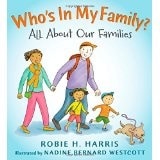 Who’s in My Family
Who’s in My Family
Families come in all shades and groupings ”bio families, stepfamilies, foster families, and adopted families. Who’s in My Family: All about Our Families by Robie H. Harris and illustrated by Nadine Bernard Westcott presents a wide array of family constellations. Most readers will be able to spot their own family reflected in the range depicted in the illustrations. The multicultural illustrations depict families as they participate in several activities: eating, exercising, visiting the zoo, etc. While the variety of families is richly depicted, the unifying thread of the story is that families enjoy spending time together and love each other regardless of how alike or similar they look.
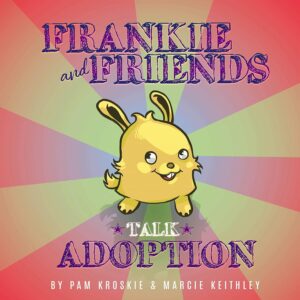 Frankie and Friends Talk Adoption
Frankie and Friends Talk Adoption
Using simple, spare text, the authors skillfully raise important talking points that can help adoptive parents address their young children’s questions about adoption. Written by two adoptees, the narrative clearly arises from their lived expertise. Frankie and Friends Talk Adoption would be an excellent addition to the family adoption library.
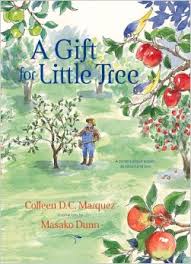 A Gift Little Tree A beautiful adoption parable about a fruitless apple tree, an abundant apple orchard, one wise farmer, and the greatest gift of all, is a lovely picture book that captures this concept in exquisite watercolor drawings that are paired with gentle text. (Amazon includes this description: A parable about adoption, this charming story tells of an apple tree who is unable to bear fruit” no matter how hard she tries””until a wise farmer finds a way. He grafts a bud onto Little Tree’s limb, and in time she becomes the most colorful tree in the orchard. All those who have experienced the bonds of family in more ways than one will share in Little Tree’s delight when she discovers that it does not matter if her apples came from another tree. She loves them as her very own. Existing adoptive parents, as well as those exploring the possibility of adoption for the first time, will find Little Tree’s story especially touching.
A Gift Little Tree A beautiful adoption parable about a fruitless apple tree, an abundant apple orchard, one wise farmer, and the greatest gift of all, is a lovely picture book that captures this concept in exquisite watercolor drawings that are paired with gentle text. (Amazon includes this description: A parable about adoption, this charming story tells of an apple tree who is unable to bear fruit” no matter how hard she tries””until a wise farmer finds a way. He grafts a bud onto Little Tree’s limb, and in time she becomes the most colorful tree in the orchard. All those who have experienced the bonds of family in more ways than one will share in Little Tree’s delight when she discovers that it does not matter if her apples came from another tree. She loves them as her very own. Existing adoptive parents, as well as those exploring the possibility of adoption for the first time, will find Little Tree’s story especially touching.
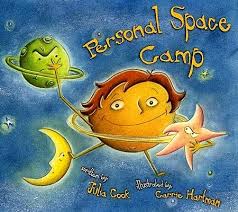
Personal Space Camp
One excellent resource is a marvelous book by Julia Cook titled, Personal Space Camp. With a deft sense of humor and zany illustrations by Carrie Hartman, this book tackles the complicated concept of personal space. Louis, the confused main character loves the world of outer space. But when it comes to personal boundaries, Louis is clueless. His frustrated teacher arranges for him to attend Personal Space Camp. This thrills Louis. He is surprised to learn that he will not be an astronaut exploring. Louis is, however, entering unexplored territory: the world of personal space boundaries. Personal Space Camp is entertaining and informative without being preachy. It conveys important information that will assist kids that lack an understanding of social cues.
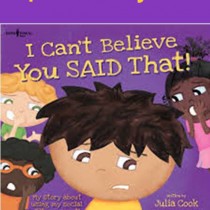
I Can’t Believe You Said That
Julia Cook has written several other books that delve into the confusing world of social cues and interaction. One that is also quite helpful is, I Can’t Believe You Said That. (Illustrated by Kelsey De Weerd, it features multicultural characters.) The story helps kids discern the difference between saying something true: You are fat, versus something that is appropriate: You are a good cook.
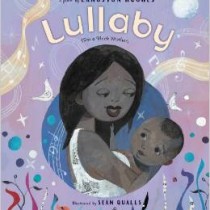
Lullaby
What greater blessing than that of a mother’s love? It is exquisitely depicted in the book, Lullaby (for a Black Mother.) Based on the Langston Hughes poem, it is illustrated by Sean Qualls in acrylic, pencil, and collage.
This lovely book beautifully captures the intimacy of a bedtime ritual. The text is melodious, soothing, and accompanied by pictures in the perfect palette of soft hues of blues, purples, and aqua. When I view the book’s universal theme of mother/child connection through the lens of adoption-attunement, what do I notice? Read more
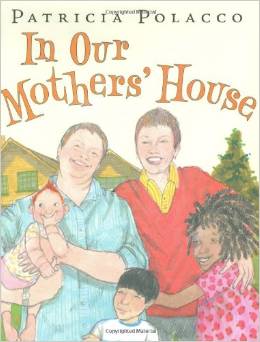
In Our Mother’s House
As an adoptive parent, an adoption coach, and a writer on adoption issues, I found In Our Mother’s House by renowned author, illustrator Patricia Polacco exceptional. As is probably obvious from the title, the story focuses on a/n (adoptive) family with two mothers. Readers searching for stories that include LGBTQ families will appreciate this upbeat and poignant tale. Read more
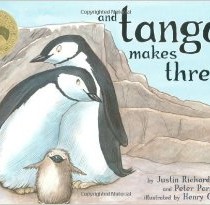
And Tango Makes Three
And Tango Makes Three is a charming book that presents a sweet story of â family as different but still very much a family. On the flyleaf of the book is this quote: “In the zoo, there are all kinds of animal families. But Tango’s family is not like any of the others. Tango has two dads. Read more
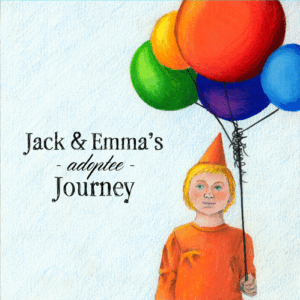
Jack & Emma’s Adoption Journey
Jack & Emma’s Adoption Journey speaks about adoption through the adoptee’s personal lens. It is a short yet powerful book. Written by an adult adoptee, the story focuses on the thoughts and feelings of Jack and Emma. The text on each page is accompanied by an author’s note addressed to the adoptive parent.
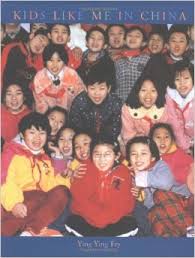 Kids Like Me in China
Kids Like Me in China
Kids Like Me in China follows a young girl on her homeland visit to China. The story also tackles both generalized adoption concepts and some of the more difficult/serious aspects of international adoption: abandonment, one-child-family-rules, special needs issues and orphaned children who never get adopted. The topics are handled with respect and honesty in a way that a child can read and absorb. Photographs from her actual trip illustrate the story. Although published in 2001, the book is still relevant and a worthwhile read.
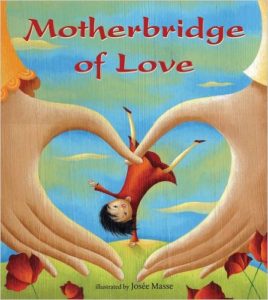 Motherbridge of Love
Motherbridge of Love
Motherbridge of Love If you have not read Motherbridge of Love, a story about a little girl adopted from China and how both her mothers love her, I highly recommend this exquisite picture book. This wonderful book clearly champions respect for and validates a child’s feelings for his birth and adoptive mothers. When we open the space for a child to hold his birth family in a place of respect, we allow them to honor that part of themselves too. My daughter, an adult adoptee, and I both believe it is one of the best adoption books for kids.
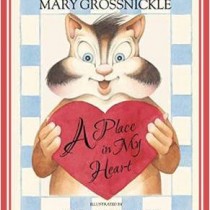
A Place in My Heart
Mary Grossnickle’s sweet story, A Place in My Heart, is one great example of a story that validates the adopted child’s point of view. Charlie a chipmunk adopted into a family of squirrels wrestles with the differences in their appearance. Adoptees commonly feel like they do not quite fit so they will easily identify with how Charlie struggles. Read more
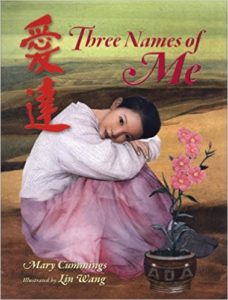 Three Names of Me
Three Names of Me
Tells the story of a little girl who was adopted from China who has three names: “My first name was whispered to me by my first mother; when I was born; it’s someplace in my heart.” Even though the child is unable to recall it, she finds comfort in the belief that her first mother called her by a name, one that is no longer part of conscious memory but it still part of her history. Further along her timeline, at her orphanage, she was given the name Wang Bin which means gentle and refined.The child experiences a sense of being seen as an individual worthy of a name that captures who she is. This affirms her dignity, acknowledges her journey through to adoption, and is a treasured part of her. Finally, from her adoptive parents, she receives her third name: Ada, a phoneme of the Chinese Ai da which means love arrived. Three Names of Me is a heartfelt tale of tradition, identity, and history.
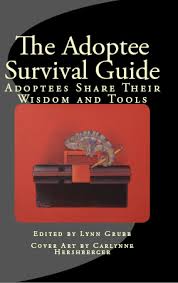 The Adoptee Survival Guide
The Adoptee Survival Guide
Opens a window into the actual experiences of adoptees who are now adults. Each shares their personal truth and offers insight into how we can support adoptees as their parents, partners, and peers. Much of their message is painful to hear because it shines a light on the dark underbelly of adoption that is grounded in loss, grief, and pain. Truth is often difficult to confront and it is important that we acknowledge and deal with it. Living with or in a lie is far more detrimental for all.
The message this book delivers is clear: Tell the truth; share it with respect and compassion; honor the reality of adoption is not only the benefits, but also the co-existing grief, loss, pain, identity confusion, and ambivalence. While it may be tempting to hold back difficult information or to skew the truth through omission or actual untruths, the damage such falsehoods generates are devastating to the parent/child relationship.
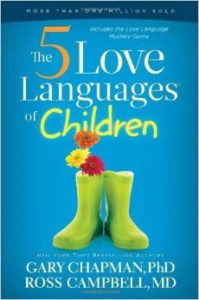 The 5 Love Languages of Children
The 5 Love Languages of Children
In a blog post, we discussed The 5 Love Languages of Children, by Chapman & Campbell and learned the benefits of using a child’s primary Love Language because it provides a direct way to connect with them. The 5 Love Languages of Children asserts that once parents start speaking in a language that the child understands fluently, communication improves dramatically. The child’s Love Language provides a fast lane to their attention and their hearts. To recap, the Five Love Languages are: Words of Affirmation, Quality Time, Physical Touch, Receiving Gifts, Acts of Services Read more
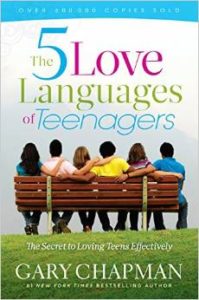
Chapman has written several books on the concept of Love Languages and how they operate within relationships to forge communication that lands and/or misses the mark. This book is a foundational read in one’s effort to communicate from the heart, to the heart of those whom we love and care about. This is a superb tool to have in your relationship toolbox. Parents with teenagers will benefit from reading The Five Love Languages for Teens.
Forever Fingerprints
Behind its simple story line, Forever Fingerprints models Adoption Attuned* relationships. It speaks to child and parent. As an adoption coach as well as an adoptive parent, I know it is important for parents to clearly establish that adoption is a suitable topic for family discussion. While this may seem obvious, to children it is not. In the absence of expressed permission, kids will assume that adoptions conversations are off limits. They will fear that it might hurt their (adoptive) parents if they talk about their concerns, mixed feelings and sharing their thoughts about their birth parents. And so, many wrestle with heavy worries weighing down their hearts. Forever Fingerprints is an easy and enjoyable way for parents to talk about some of the “hard stuff” of adoption.
Twenty Things Adopted Kids Wish Their Adoptive Parents Knew
Twenty Things Adopted Kids Wish Their Adoptive Parents Knew by Sherrie Eldridge is an essential book in the adoptive family’s library. Written by an adoptee, it provides a broad sweep of the issues adoptees face. With this awareness parents can provide the emotional context their children need to develop healthy attachments and to reconcile the challenges of being adopted. It is never too early or too late to read this book. A gem.
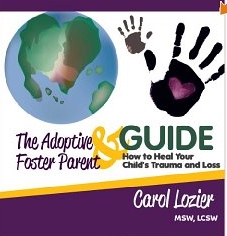 The Adoptive & Foster Parent Guide
The Adoptive & Foster Parent Guide
The Adoptive & Foster Parent Guide: How to Heal Your Child’s Trauma and Loss by Carol Lozier, LCSW The book is written in a straight-forward style that is practical and easy to understand. Because it is compact, overwhelmed parents can read it quickly and put the suggestions to work immediately.
Carol writes in a manner that is informative, compassionate, and encouraging. She understands that adoptive parenting is different from bio-parenting and requires adoption-appropriate techniques. She shares tools that parents can use to educate themselves, family and friends. This helps to create a team that supports the family instead of critics who sit in judgment. Carol Lozier’s book is practical and insightful.
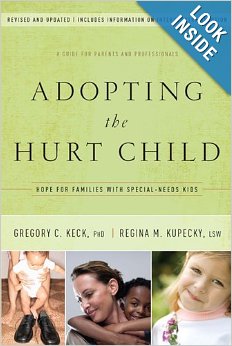 Adopting the Hurt Child
Adopting the Hurt Child
Adopting the Hurt Child: Hope for Families with Special-Needs Kids A Guide for Parents and Professionals by Gregory Keck and Regina Kupecky; 1995 by Gregory C. Keck and Regina M. Kupecky; Pinon Press ““ For those who have adopted special needs children, this book is helpful in its realistic portrayal of the challenges and also the hope and opportunity in parenting children who have been hurt. I appreciated the vingettes interspersed throughout the book that helped illustrate the concepts that Keck and Kupecky were discussing. This book also includes a chapter on intercountry adoption, which we found helpful.
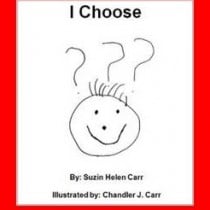 I Choose
I Choose
Children enjoy being able to decide things for themselves. As parents we often make the bulk of the decisions in our children’s lives. Most of us understand that decision making is a skill. Like all skills, mastery only comes through practice. Long before kids become proficient decision makers, they will plod through many errors in judgment. As parents, we face a learning curve too as we strive to determine when is it safe for kids to make a choice and when must the decision fall on our shoulders?
 Adoption and Suicidality: An Anthology of Stories, Poems, and Resources for Adoptees, Families, Healthcare Professionals, and Allies Tragically, suicidality is one of those heart-breaking realities of adoption. Through personal stories of those who struggle with suicidality, this book provides insight into the feelings, forces, and thoughts of those who struggle with suicidality
Adoption and Suicidality: An Anthology of Stories, Poems, and Resources for Adoptees, Families, Healthcare Professionals, and Allies Tragically, suicidality is one of those heart-breaking realities of adoption. Through personal stories of those who struggle with suicidality, this book provides insight into the feelings, forces, and thoughts of those who struggle with suicidality
Adoption and the Jewish Family
Adoption & the Jewish Family by Shelley Krapnek Rosenberg ““
This book addresses some of the unique issues that Jewish families face when adopting.
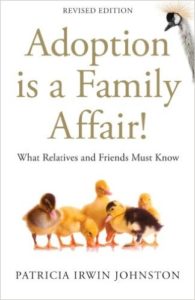 Adoption is a Family Affair
Adoption is a Family Affair
Adoption Unfiltered is a ground-breaking book that examines adoption from the lived experience of an adult adoptee, a birth mother, and an adoptive mother. Poignant, eye-opening, and a must-read for all shaped by adoption.
The Shoebox Effect
Anger: How To Live With And Without It
Anger: How To Live With And Without It by Albert Ellis, 1977 by Reader’s Digest Press and Thomas Crowell Company. Though this is not directly a book about adoption, it has helped me greatly in my response to not only my children but all people in my life. Anger is partly a learned response. Learning and discerning when and how to be angry can improve relationships greatly, especially when we may have children who come with a great deal of anger over past hurts. I highly recommend this.
 Being Adopted
Being Adopted
by David Brodzinsky Ph. D., Marshall D. Schechter M.D. And Robin Marantz Henig ““ This book covers all stages of development, infancy through adulthood, of the adoptee. The authors use stories from their patients and surveys to illustrate the 6 major themes of their book; life from the adoptees perspective, how the adoptee feels about being adopted changes throughout their developmental stages, giving the adoptee a sense of normal, creating individuality as there is no right way to experience adoption, search for self when a part of them has been cut out of their life and the adoptees sense of loss. I appreciated how the authors tied the scientific evidence to life through the adoptees experiences.
The Blessing of a B Minus: Using Jewish Teachings to Raise Resilient Teenagers by Wendy Mogel Similar in nature and follow up to Wendy Mogel’s first book and looks at the blessings of raising teens and some of the issues today’s parents face and practical advice for dealing with them. Although rooted in Jewish precepts, I agree that Mogel’s compassion and authenticity will ring true with parents of all faiths facing the tumultuous teen years.
The Blessing Of A Skinned Knee: Using Jewish Teachings to Raise Self-Reliant Children by Wendy Mogel Although not particularly about adoption, this book is a guide to parenting and supports a coaching model in that we cannot, nor should we save our children from experiences from which they can grow to be self-reliant, compassionate and ethical children. Draws on the wisdom of the Torah, the Talmud, and other Jewish teachings and employs the framework of nine blessings to address key parenting issues such as respect for adults, chores, keeping expectations in line with your child’s temperament, avoiding over scheduling and overindulgence, and more.
Building the Bonds of Attachment: Awakening Love in Deeply Troubled Children by Daniel A. Hughes looks at, through the experience of one child how attachment can occur, even at a later date in a child’s life. Attachment only worked by using a technique called “The Attitude” (its five qualities include being accepted, curious, empathetic, loving and playful) and by creating strong boundaries.
 The Connected Child: Bring Hope and Healing to Your Adopted Family A brilliant book filled with strategies to assist adoptive families. Dr. Karen Purvis is the Director of the Institute of Child Development at Texas Christian University (TCU) in Fort Worth, Texas. Her work focuses on building and strengthening relationships.
The Connected Child: Bring Hope and Healing to Your Adopted Family A brilliant book filled with strategies to assist adoptive families. Dr. Karen Purvis is the Director of the Institute of Child Development at Texas Christian University (TCU) in Fort Worth, Texas. Her work focuses on building and strengthening relationships.
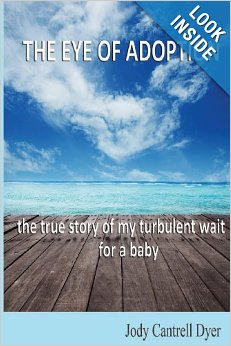 The Eye of Adoption
The Eye of Adoption
by Jody Dyer Jody Cantrell Dyer writes from the heart with integrity, honesty, humor, compassion, and a commitment to guide others who wait for â child to arrive through private agency adoption. She offers her experience as encouragement as they too, work through the arduous pre-adoptive process. When adopting, a baby does not arrive after a nine-month wait; sometimes the matching process takes many years.
Jody’s story gives an inside view of how one person successfully navigated the journey. She and Kerri created an open adoption that works for them. It acknowledged the grief and loss of all parties, Kerri’s, Bryant, and their extended families and continues an ongoing relationship.
Dyer understands that adoption must be focused on finding the best family for a child versus finding a child for hopeful parents.
 How It Feels to Be Adopted
How It Feels to Be Adopted
How It Feels to Be Adopted by Jill Krementz, 1982 by Jill Krementz; Alfred Knopf, Inc. ““ This book is smaller than Sacred Connections but similar in its structure of telling the stories of adoption, this time exclusively from the children’s viewpoints, ages ranging from eight to sixteen years old and from various backgrounds. It’s an honest book that provides great conversation starters for children as well as letting them know they are not alone in the adoption experience.
 In On It: What Adoptive Parents Would Like You To Know About Adoption. A Guide for Relatives and Friends
In On It: What Adoptive Parents Would Like You To Know About Adoption. A Guide for Relatives and Friends by Elizabeth O’Toole
Let’s Talk About It: Adoption (Mr. Rogers)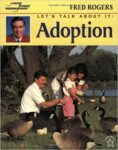
by Fred Rogers of Mr. Rogers’ Neighborhood does an excellent job of describing adoption, giving equal weight to the need of the child and the need of adults to be parents. The pictures are diverse, offering different ethnic backgrounds of both the child and the parents. It is an easy, short read and a great book for children of pre-school and grade school ages. Our kids had us read it together over and over again.
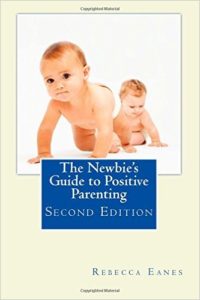
The Newbies Guide to Positive Parenting
Although not specifically directed at adoptive families, The Newbies Guide to Positive Parenting by Rebecca Eanes definitely concentrates on sustaining connection, on parenting via modeling the attitudes and behaviors parents want their children to learn. Rebecca asserts an important distinction: “leading and controlling are very different.” One invites cooperation; the other invites rebellion. One is respect-based; the other is fear-based.
Here are a few memorable quotes from the book:
- Positive discipline isn’t about making a child pay for his mistake but rather learn from it
- It’s about teaching them to do what is right instead of punishing them for doing what is wrong.
- There is no such thing as an unimportant day when you are shaping a child’s life. Be intentional about what it is you are writing.
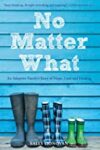
No Matter What by Sally Donovan Yes, love heals but parenting kids with trauma/neglect histories, requires so much more. Immerse yourself in this story of the fierce love of this adoptive family. Understand the day to day challenges as these children learn to deal with and heal from their past. Cheer on these parents as they are called on to muster every ounce of patience, determination, and hope while they discover what their kids need emotionally, academically, and socially and then work to provide it. Experience the heroism of both kids and parents who must confront the aftermath of abuse, learn to cope with and channel the anger, shame, and grief. This story will break your heart wide open, expand your understanding of the life-long impact of abuse and neglect and educate you on how to be a better, friend, teacher, family member, and perhaps call you to rise to the challenge of parenting kids with tough starts. At the very least, it will open your eyes and hearts and draw you in to view adoptive families with more empathy and less judgment. This is not a happily-ever-after tale but a true portrait of what it takes as a family to overcome such a disastrous beginning and to triumph.
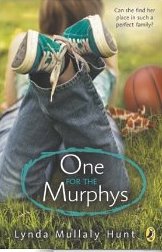
One for the Murphys by Lynda Mullaly Hunt
Get ready for a rollicking ride on an emotional roller coaster. One for the Murphys by Lynda Mullaly Hunt will make you laugh and weep as you follow Carly Conner’s journey through foster care. She’s a sassy, resilient survivor shaped by her single mom’s inconsistent parenting. Carly never knows what to expect: her mom’s version of nurturing or outright neglect. When a violent stepdad enters the picture, home life deteriorates from inadequate to life-threatening.
Carly enters foster care with the Murphys. Life becomes more complicated than ever as Carly experiences what it feels like to have a mom that knows how to love unconditionally and who enjoys caring for her children. The contrast between her two families becomes apparent to Carly. Now that she’s experienced a calm, loving family home, she wants that for herself too. Carly must face a gut-wrenching decision–deciding whose daughter she wants to be.
In Carly, Lynda Mullaly Hunt has created an unforgettable character that will grab your heart and leave an indelible mark on your memory. A truly exceptional read.
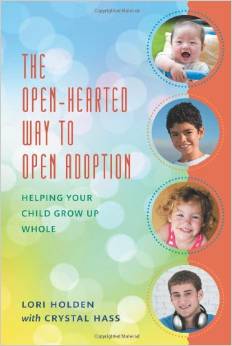
The Open-hearted Way to Open Adoption
This excellent book overflows with practical suggestions for how to navigate open adoption. It offers ideas for all members of the triad. The greatest value of The Open-hearted Way to Open Adoption is the philosophical assumption that underpins the book: the child’s best interest is the foundational premise. The foremost criteria must to be child-focused and to recognize the distinction between contact and openness.The Open-hearted Way to Open Adoption is a positive and inspiring book that will touch your heart as well as provide you with persuasive, practical, and useful ideas. I am an adoption coach and a mom of now-adult children who came to us in the 1980s through closed adoptions. My children have reconnected with their birth mothers and I have seen first-hand the beneficial impact this reunion has brought all of us but most especially my children and their birth mothers. Lori points out that she takes her children to various professionals who can provide services that she cannot: physician, dentist, therapist, etc. She writes, “I can’t fill a certain emotional need that Tessa has, but I can take her to the well. (Tessa’s birth mother, Crystal) That is love and that is parenting with a child’s best interest at heart. I would assert that no adoptive parent wants to leave their children unsupported as they process difficult parts of the adoption experience.
Open adoption is not easy nor is it perfect, but it is far better than the traditional secrecy-based closed adoptions. The greatest ingredient to success is a heart-connected attitude. This book offers a welcome, worthwhile resource for parents who are embarking on the adventure of open adoption parenting. As Lori writes, “Open adoption is a journey rather than a destination.”
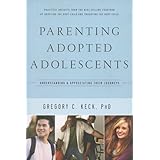
 Parenting Adopted Adolescents
Parenting Adopted Adolescents
by Gregory C Keck offers a hopeful message that acknowledges and understands teen behavior as a regular developmental pattern and then gives parents tools for handling the behavior in light of new understanding of the behavior. It is all about relationship!
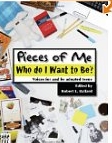 Pieces of Me
Pieces of Me
Pieces of Me: Who do I Want to Be by L. Ballard, editor, EMK A series of essays written by adoptees. They face the same identity issues of all teenagers with the added complication of adoption themes. Well written in a way that addresses difficult topics without sugar-coating or catastrophizing. A heartfelt exploration that might provide a much-needed sense of common experience to a teenage adoptee and several possible roadmaps that could inform their own adoption journey.
 The Primal Wound
The Primal Wound
The Primal Wound: Understanding the Adopted Child by Nancy Newton Verrier asserts that a wound exists when a child is separated from his/her mother. The Primal Wound explains how this wound came to be and how it manifests itself in various ways throughout the developmental stages. The book provides solutions to facilitate healing the wound for different age groups and in different situations. This book validates the existence of the Primal Wound and offers great insight to behaviors caused by it.
The solutions are extremely helpful for any adoptive parent.
 Raising Adopted Children
Raising Adopted Children
Raising Adopted Children, Revised Edition: Practical Reassuring Advice for Every Adoptive Parent by Lois Melina An updated version that is comprehensive in covering adoption issues and a good resource book.
 Sacred Connections
Sacred Connections
Sacred Connections: Stories Of Adoptionessays by Mary Ann Koenig and Photography by Niki Berg; 2000 by Mary Ann Koenig; Running Press Book Publishers ““ Mary Ann Koenig, a clinical psychologist and herself an adoptee, interviews those connected through adoption. The stories are real, touching, and span the various experiences of adoption: some who find their birth parents and some who do not, some who are excited about the reunion, and some who are disappointed, birth parents who are have searched for their children, etc. As the title suggests, the book honors all connections and this is evident in how carefully and candidly the stories are told. I highly recommend this book as a bridge to discussions with your adolescent about adoption.
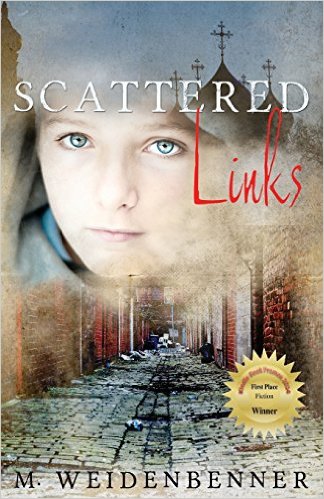
Scattered Links
Scattered Links by M. Weidenbenner is exceptionally written. Page after page, I ached for Oksana, the twelve-year-old heroine, for the sad reality that was/is her life and that of many other orphanage-raised, severely traumatized children who fear to trust and open themselves to attachment.
The emotional struggles portrayed ring true for both Oksana and her adoptive parents. Self-doubt, grief, loss are experienced by the entire family, not just the child. It affects the way they relate to one another. It factors into their thoughts, beliefs, and expectations
History has taught Oksana that trust is a luxury they cannot afford. She learned that lesson well. In some cases, her wariness and resistance to connect was the only thing that kept her alive. (No wonder they are so reluctant to change their strategy. I do have one criticism of this wonderful book: the celebration of Gotcha Day. this is a term many adoptees find offensive. They find it depersonalizing and parent-centric.
 Seven Core Issues in Adoption and Permanency: A Comprehensive Guide to Promoting Understanding and Healing In Adoption, Foster Care, Kinship Families and Third Party Reproduction This book is foundational to adoptive parenting. It explores some of the fundamental challenges that adoptees and their families face. Awareness is the first step to understanding what support adoptees need as they strive to understand what is means to be adopted.
Seven Core Issues in Adoption and Permanency: A Comprehensive Guide to Promoting Understanding and Healing In Adoption, Foster Care, Kinship Families and Third Party Reproduction This book is foundational to adoptive parenting. It explores some of the fundamental challenges that adoptees and their families face. Awareness is the first step to understanding what support adoptees need as they strive to understand what is means to be adopted.
The Tell: A Memoir Heartbreaking, honest. A mother shares her family’s worst nightmare. It is both an immensely cautionary tale and a story of family commitment. This is a book you will never forget. The Tell: A Memoir by Mags Karn chronicles a family walking through the unspeakable horror of sexual abuse perpetrated by one child against his sisters.
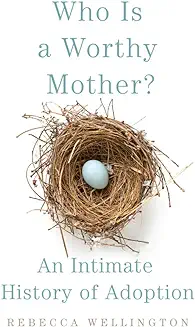
In the title of her excellent book, Rebecca Wellington asks a pivotal question: Who is a worthy mother? Her well-documented research spotlights factors that usually remain unacknowledged or dismissed. The history of the policies, beliefs, judgments and decisions determining which women are deemed entitled to parent their children reveal that they were based on a narrow and biased lens. This book provides a much-needed historical perspective that exposes many uncomfortable truths about the motivations, policies, and practices that have shaped our cultural thoughts and beliefs about adoption, birth mothers and adoptees. Everyone connected to adoption should read it.
Why Love Matters
Why Love Matters: How Affection Shapes a Baby’s Brain by Sue Gerhardt Explains why love is essential to a baby’s development and how this starts very early on in the womb and has lasting effects on the infant.
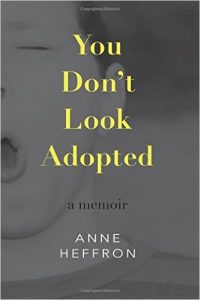
You Don’t Look Adopted
We parents often lament that children do not come with a handbook. You Don’t Look Adopted is the next best thing. Anne has a great deal of insight to share with us. It is a raw, unflinching look at adoption through an adult adoptee’s experiences. Her story will inspire parents who are currently raising children to create the spaces, open the conversations, and help support their kiddos through the adoption-related stresses and fallout. This is an exceptional book that is well worth the read.
 Yushi and the Tall Man
Yushi and the Tall Man
Yushi and the Tall Man by Tami Staut ““ A children’s (pre-school and elementary school) book about adopting a Chinese baby. This is a great children’s book to open discussions about adoption, and Chinese baby girl adoptions in particular. The story follows what happens to most Chinese baby girls who are abandoned in China, and has a happy ending with an adoptive family. The illustrations are wonderful and calming.
Books–Children’s Fiction
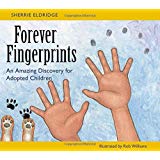 Forever Fingerprints
Forever Fingerprints
The wonderful adoption classic, Forever Fingerprints by Sherrie Eldridge is being reissued by Jessica Kingsley Publishers. An adoptee and a staunch advocate for adoptive families writes, who LIVES the adoption journey, Sherrie connects with adoptees’ hearts and validates their experience. She has written many books about the adoption experience. Forever Fingerprints, a picture book serves a younger audience than Sherrie’s other books.
Behind its simple storyline, Forever Fingerprints models Adoption Attuned relationships. It speaks to the child and parents. As an adoption coach as well as an adoptive parent, I know it is important for parents to clearly establish that adoption is a suitable topic for family discussion. While this may seem obvious, to children it is not. In the absence of expressed permission, kids will assume that adoption conversations are off-limits. They will fear that it might hurt their (adoptive) parents if they talk about their concerns, mixed feelings, and sharing their thoughts about their birth parents. And so, many wrestle with heavy worries weighing down their hearts. Forever Fingerprints is an easy and enjoyable way for parents to talk about some of the “hard stuff” of adoption.
Help A Hamster
Help A Hamster by Hilary Robinson (Picture book for children) Meet Alphie, his classmates, and their pet hamster, Henry. Turns out, Henry is a she who recently delivered a litter. Taking care of all those babies overwhelms Henry so Alphie and his friends search for safe, loving homes for the babies. They appoint Alphie hamster monitor. Alphie, an adoptee, sees the parallels in his own story and works hard to find homes where each of the hamsters will be happy.
This book includes information about adoption that is presented in a gentle and subtle tone. It will offer many teachable moments for kids to learn about adoption whether they are adopted themselves or not. The illustrations by Mandy Stanley are lovely, engaging, and inclusive. As in real life, families come in different shapes and sizes. Help a Hamster is an excellent addition to the family library.
 As Simple As It Seems
As Simple As It Seems
by Sarah Weeks. Directed toward late elementary and middle-schoolers, Highlights the impact of a fifth-grade girl learning she is adopted. Deals with the powerful questions of nature vs. nurture as the protagonist discovers how the behavior of biological parents may or may not inform her own choices and character. An outstanding book.
Counting Down: A Memoir of Foster Parenting and Beyond by Deborah Gold is a deeply moving memoir about both the reward and daunting challenges of being a foster family. Deborah Gold incorporates both parent and child perspectives creating a unique and valuable perspective on fostering. A great read for anyone even if not a foster or adoptive parent.
The Strangely Hopeful Story of Foster Care and Adoption in Appalachia by Wendy Welch Fall or Fly is a compelling, unvarnished glimpse into the complex world of foster care and adoption in modern-day Appalachia. Dr. Welch provides readers with a multifaceted view of the system through the eyes of children, foster parents, and caseworkers offering a more complete understanding of the foster care system.
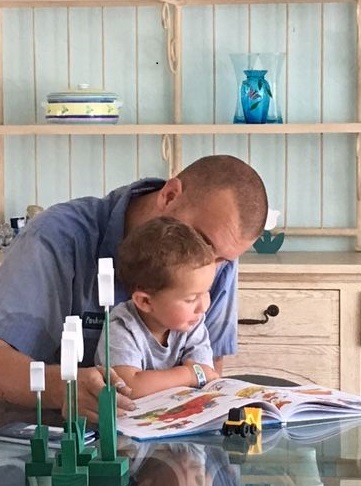 Articles
Articles
- Support for Adoptive Parents: Know Your Options
- What to Expect From An Adoption Coach
- Creating an Adoption Plan With Your Adoption Coach
- Pre-Adoption: The Big Questions to Ask and Answer
- Support for Adopted Children: Know Your Options
Featured Posts for Adopting.com
- Understanding the Need for Positive Adoption Language,
- Moving Beyond Color Blind Parenting to Value The Human Rainbow,
Featured Posts for Americaadopts.com
- The Secret to Creating a Successful Open Adoption Relationship with a Birth Mother
- How Open Adoption Builds Bridges to Healing
- Giving Thanks for Adoption
Books–Non-fiction
Written by Growing Intentional Families Together Coaches
 ABC, Adoption & Me (REVISED & REILLUSTRATED The original version of this book launched in 2013. It earned many awards[1] and adoptive families reported that it genuinely helped them explore and discuss adoption with their little children, in a way that kids felt supported and that also deepened their connection. Using the familiar framework of an alphabet book, it introduces a range of adoption-connected concepts, from the very simple such as “B is for bellybutton. Everyone has one,” to “R is for real. My birth parents and my adoptive parents are all real. I’m a real kid and we are a real family.
ABC, Adoption & Me (REVISED & REILLUSTRATED The original version of this book launched in 2013. It earned many awards[1] and adoptive families reported that it genuinely helped them explore and discuss adoption with their little children, in a way that kids felt supported and that also deepened their connection. Using the familiar framework of an alphabet book, it introduces a range of adoption-connected concepts, from the very simple such as “B is for bellybutton. Everyone has one,” to “R is for real. My birth parents and my adoptive parents are all real. I’m a real kid and we are a real family.
ABC, Adoption & Me (REVISED & REILLUSTRATED) allows parents to plant seeds of understanding which they can expand over the years in age-appropriate ways. This revised version reflects the latest in the professional understanding of adoption complexity, the challenges of young adoptees, and the conversations and strategies that draw families in support of one another. Wesley Blauvelt’s evocative illustrations are compelling. The illustrations in this revised version of ABC reflect a more nuanced emotional tone and better capture adoption complexity. We hope you agree! Includes a Parent Guide.
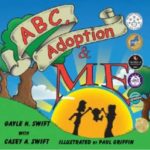 ABC Adoption and Me, A Multicultural Picture Book for Adoptive Families by Gayle H. Swift Named a Notable Picture Book of 2013 by Shelf Unbound (This is Gayle’s original book about adoption. The revised version is described above.) It celebrates the blessing of family and addresses the difficult issues as well. With charming, exuberant illustrations and a diverse representation of families, ABC, Adoption & Me will warm hearts, deepen understanding of what it means to be an adoptive family, and provide teaching moments that bring families closer, connected in truth, compassion, and joy.
ABC Adoption and Me, A Multicultural Picture Book for Adoptive Families by Gayle H. Swift Named a Notable Picture Book of 2013 by Shelf Unbound (This is Gayle’s original book about adoption. The revised version is described above.) It celebrates the blessing of family and addresses the difficult issues as well. With charming, exuberant illustrations and a diverse representation of families, ABC, Adoption & Me will warm hearts, deepen understanding of what it means to be an adoptive family, and provide teaching moments that bring families closer, connected in truth, compassion, and joy.
Truly a multiple-award-winning book about the experience of adoption, ABC, Adoption & Me breaks new ground in the field of adoption experience integration. Useful for children, families, caretakers, and teachers, ABC, Adoption & Me offers positive presentations of many common experiences shared by adoptive children and families. Prefaced by a helpful introduction titled How to Use ABC, Adoption & Me, this cheery, vivid color illustrated ABC book focuses on special topics related to adoption in a non-judgmental and respectful way. Some examples are, “C is for children. You can be adopted at any age, from tiny babies to teens” or “M is for miss. Sometimes I miss my birth parents. I wonder if they miss me too.” Also memorable is “P is for parents. Birth parents gave me life. Adoptive parents gave me a (forever) family.” And finally, there is “Z is for zig-zag. Sometimes I feel happy and sad about being adopted.” Written by an adoptive mother/daughter team, ABC, Adoption & Me uses bright cartoon illustrations to present interracial adoptive families and origin birth families with equal validity and authenticity, as well as many other adoption sensitive issues and topics. ABC, Adoption & Me deserves every single one of its many awards and should be a part of every child’s library.
We’re Adopted, So What? Teens Tell It Like It Is
Kids need to see themselves in the books they read. We’re Adopted, So What? tells the story of a diverse group of girls and the complex emotions and thoughts that often come with being adopted. Aimed at middle-schoolers, it strives to help adoptees grapple with and discuss their adoption-connected thoughts, feelings, and emotions.
Being a teenager is tough enough. When you factor in the complexities and challenges of being adopted, it is exponentially harder. This graphic-style book, We’re Adopted, So What? features five teen girls who share a huge thing in common: each of them was adopted. This shared experience draws them together yet the distinctions between their experiences are as unique as their personalities. Feisty, fun and outspoken, the girls tackle some tough topics. They share their thoughts and feelings about adoption, how it shapes their world and relationships, creates challenges, burdens them with curiosity, frustration, anger, and grief, and shows how they strive to blend together their biological and their adoptive worlds.
Open adoption has become the norm for most contemporary domestic adoptions yet questions and complications still remain for adoptees and their families. How can all these people cooperate to create healthy, supportive relationships that best support adoptees? How does a young adoptee balance their dual loyalties and connections? How do they weave the spectrum of their feelings, challenges, and experiences into a cohesive identity?
We now recognize that connection to, and respect for, an adopted child’s biological roots is integral to an adoptee’s ability to successfully unify their dual heritage. Still, the concept of openness remains shrouded in apprehension, confusion, and curiosity. How is it possible for a child to have two sets of parents involved in their lives? Against this backdrop of openness, how do teens in international or traditional closed adoptions, feel about and deal with their lack of connection with birth families?
This book overflows with practical suggestions for how to navigate the constantly changing seas that adoptees face. The influences of DNA are forever, just as the influence of the adoptive family’s nurturing will permanently shape the child’s worlds. The process is complicated and can be difficult to articulate. This book provides a way to spark these important conversations with families or friends. It validates and renders compassionate witness to the adoptee experience.
Reimagining Adoption: What Adoptees Seek from Families and Faith by Sally Ankerfelt, M. Div., and Gayle H. Swift, CPC
As certified coaches, cofounders of GIFT family services, and as adoptive parents, the authors bring a unique blend of professional skills and personal experience with adoption to their book. Sally is a Lutheran minister and Gayle is an award-winning author. This combination of education and experience provides them with a robust perspective on the issue. They see beyond the cultural mythology and understand the practical reality that challenges adoptees, their families, and the people who support them. They infuse this knowledge into an examination of adoption practice and on forging ways to improve it. “Reimagining Adoption: What Adoptees Seek from Families and Faith” aligns personal experience, trauma research, expert insights, and adoptee interviews into adoption-attuned strategies that support adoptees and their families. They infuse this knowledge into a reimagining of adoption practice inside and outside the church.
The book is intended for anyone who is interested in understanding adoption through the lens of faith as well as how congregations can grow in support of adoptees and their families. One thing that makes the book powerful is that adoptee interviews form the basis of the book. The authors heard from many adoptees how their faith has been challenged because of what people in their congregations and some family members have told them. For example: “I feIt was God’s will,” “We were meant to be together,” “You should feel lucky you were adopted.”
Reimagining Adoption is a resource that is both practical and visionary, one that understands the history as well as the current needs of adoptees and their families. This Adoption-attuned approach will help families build a deeply connected life together, a fundamental goal of every adoptive family.
Additional Authors and Titles
 Who’s in My Family
Who’s in My Family
Families come in all shades and groupings””bio families, stepfamilies, foster families, and adopted families. Who’s in My Family: All about Our Families by Robie H. Harris and illustrated by Nadine Bernard Westcott presents a wide array of family constellations. Most readers will be able to spot their own family reflected in the range depicted in the illustrations. The multicultural illustrations depict families as they participate in several activities: eating, exercising, visiting the zoo, etc. While the variety of families is richly depicted, the unifying thread of the story is that families enjoy spending time together and love each other regardless of how alike or similar they look.
“A beautiful adoption parable about a fruitless apple tree, an abundant apple orchard, one wise farmer, and the greatest gift of all,” is a lovely picture book that captures this concept in exquisite watercolor drawings that are paired with gentle text. (Amazon includes this description: “A parable about adoption, this charming story tells of an apple tree who is unable to bear fruit””no matter how hard she tries””until a wise farmer finds a way. He grafts a bud onto Little Tree’s limb, and in time she becomes the most colorful tree in the orchard. All those who have experienced the bonds of family in more ways than one will share in Little Tree’s delight when she discovers that it does not matter if her apples came from another tree; she loves them as her very own. Existing adoptive parents, as well as those exploring the possibility of adoption for the first time, will find Little Tree’s story especially touching. The book also honors the birth mother in a unique way, helping children understand how love is the motivation for her actions.”)
 Personal Space Camp
Personal Space Camp
One excellent resource is a marvelous book by Julia Cook titled, “Personal Space Camp.”With a deft sense of humor and zany illustrations by Carrie Hartman, this book tackles the complicated concept of personal space. Louis, the confused main character loves the world of outer space. But when it comes to personal boundaries, Louis is clueless. His frustrated teacher arranges for him to attend “Personal Space Camp.” This thrills Louis. He is surprised to learn that he will not be an astronaut exploring. Louis is, however, entering unexplored territory: the world of personal space boundaries. “Personal Space Camp” is entertaining and informative without being preachy. It conveys important information that will assist kids that lack an understanding of social cues.

I Can’t Believe You Said That
Julia Cook has written several other books that delve into the confusing world of social cues and interaction. One that is also quite helpful is,“I Can’t Believe You Said That.” (Illustrated by Kelsey De Weerd, it features multicultural characters.) The story helps kids discern the difference between saying something true: “You are fat,” versus something that is appropriate: “You are a good cook.”
 Lullaby
Lullaby
What greater blessing than that of a mother’s love? It is exquisitely depicted in the book, Lullaby (for a Black Mother.) Based on the Langston Hughes poem, it is illustrated by Sean Qualls in acrylic, pencil, and collage.
This lovely book beautifully captures the intimacy of a bedtime ritual. The text is melodious, soothing, and accompanied by pictures in the perfect palette of soft hues of blues, purples, and aqua. When I view the book’s universal theme of mother/child connection through the lens of adoption-attunement, what do I notice? Read more
 In Our Mother’s House
In Our Mother’s House
As an adoptive parent, an adoption coach, and a writer on adoption issues, I found In Our Mother’s House by renowned author, illustrator Patricia Polacco exceptional. As is probably obvious from the title, the story focuses on a/n (adoptive) family with two mothers. Readers searching for stories that include LGBTQ families will appreciate this upbeat and poignant tale. Read more
 And Tango Makes Three
And Tango Makes Three
This is a charming book that presents a sweet story of “family as different” but still very much a family. On the flyleaf of the book is this quote: “In the zoo, there are all kinds of animal families. But Tango’s family is not like any of the others. Tango has two dads. Read more
 Jack & Emma’s Adoption Journey speaks about adoption through the adoptee’s personal lens. It is a short yet powerful book. Written by an adult adoptee, the story focuses on the thoughts and feelings of Jack and Emma. The text on each page is accompanied by an author’s note addressed to the adoptive parent. This sidebar clarifies the moment/issue for the parent and shines a light on Jack and Emma’s action or thought being depicted on the page. Although this book is brief, it touches on some important adoptee issues, e.g., identity questions, yearning to fit in, anxiety, fear of rejection, wondering about birth parents, ambivalent feelings about birthdays, self-blame, anger and longing to understand biological ancestry. All of these thoughts are common to adoptees. Mentioning them in the story helps to normalize their thought processes and opens the door to important family conversations in which parents can listen, validate and support their child’s feelings and concerns. When parents share such conversations, they reassure their children that their love is unconditional and does not require kids to choose between their two families. It affirms that each is an integral and treasured part of the child, and by extension to the entire family. Pam Kroskie serves as the past President of the American Adoption Congress, is a Congressional Angel in Adoption Award Winner, the current president of H.E.A.R. (Hoosiers for Equal Access to Records,) and for many years has raised her voice on behalf of adoptees. She hosts AAC Adoption News and Views on Blog Talk Radio.
Jack & Emma’s Adoption Journey speaks about adoption through the adoptee’s personal lens. It is a short yet powerful book. Written by an adult adoptee, the story focuses on the thoughts and feelings of Jack and Emma. The text on each page is accompanied by an author’s note addressed to the adoptive parent. This sidebar clarifies the moment/issue for the parent and shines a light on Jack and Emma’s action or thought being depicted on the page. Although this book is brief, it touches on some important adoptee issues, e.g., identity questions, yearning to fit in, anxiety, fear of rejection, wondering about birth parents, ambivalent feelings about birthdays, self-blame, anger and longing to understand biological ancestry. All of these thoughts are common to adoptees. Mentioning them in the story helps to normalize their thought processes and opens the door to important family conversations in which parents can listen, validate and support their child’s feelings and concerns. When parents share such conversations, they reassure their children that their love is unconditional and does not require kids to choose between their two families. It affirms that each is an integral and treasured part of the child, and by extension to the entire family. Pam Kroskie serves as the past President of the American Adoption Congress, is a Congressional Angel in Adoption Award Winner, the current president of H.E.A.R. (Hoosiers for Equal Access to Records,) and for many years has raised her voice on behalf of adoptees. She hosts AAC Adoption News and Views on Blog Talk Radio.
 Kids Like Me in China
Kids Like Me in China
Kids Like Me in China follows a young girl on her homeland visit to China. Like Elias, she also visited the orphanage where she lived. She shares similar experiences and insights. The story also tackles both generalized adoption concepts and some of the more difficult/serious aspects of international adoption: “abandonment,” one-child-family-rules, special needs issues and orphaned children who never get adopted. The topics are handled with respect and honesty in a way that a child can read and absorb. Photographs from her actual trip illustrate the story. Although published in 2001, the book is still relevant and a worthwhile read.
 Motherbridge of Love
Motherbridge of Love
Motherbridge of Love If you haven’t read “Motherbridge of Love,” a story about a little girl adopted from China and how both her mothers love her, I highly recommend this exquisite picture book. Love, love, love it. This wonderful book clearly champions respect for and validates a child’s feelings for his birth and adoptive mothers. When we open the space for a child to hold his birth family in a place of respect, we allow them to honor that part of themselves too. My daughter, an adult adoptee, and I both believe it is one of the best adoption books for kids.

A Place in My Heart
Mary Grossnickle’s sweet story, “A Place in My Heart, is one great example of a story that validates the adopted child’s point of view. Charlie”“a chipmunk adopted into a family of squirrels wrestles with the differences in their appearance. Adoptees commonly feel like they don’t quite fit so they will easily identify with Charlie’s struggle. Read more
 Three Names of Me
Three Names of Me
Tells the story of a little girl who was adopted from China who has three names: “My first name was whispered to me by my first mother; when I was born; it’s someplace in my heart.” Even though the child is unable to recall it, she finds comfort in the belief that her first mother called her by a name, one that is no longer part of conscious memory but it still part of her history. Further along her timeline, at her orphanage, she was given the name Wang Bin which means “gentle and refined.” The child experiences a sense of being seen as an individual worthy of a name that captures who she is. This affirms her dignity, acknowledges her journey through to adoption, and is a treasured part of her. Finally, from her adoptive parents, she receives her third name: Ada, a phoneme of the Chinese Ai da which means “love arrived.” Three names of Me is a heartfelt tale of tradition, identity, and history.
 The Adoptee Survival Guide
The Adoptee Survival Guide
Opens a window into the actual experiences of adoptees who are now adults. Each shares their personal truth and offers insight into how we can support adoptees as their parents, partners, and peers. Much of their message is painful to hear because it shines a light on the dark underbelly of adoption that is grounded in loss, grief, and pain. Truth is often difficult to confront and it is important that we acknowledge and deal with it. Living with or in a lie is far more detrimental for all.
The message this book delivers is clear: Tell the truth; share it with respect and compassion; honor the reality of adoption””not only the benefits, but also the co-existing grief, loss, pain, identity confusion, and ambivalence. While it may be tempting to hold back difficult information or to skew the truth through omission or actual untruths, the damage such falsehoods generates are devastating to the parent/child relationship.
 The 5 Love Languages of Children
The 5 Love Languages of Children
In a blog post, we discussed The 5 Love Languages of Children, by Chapman & Campbell and learned the benefits of using a child’s primary Love Language because it provides a direct way to connect with them. The 5 Love Languages of Children asserts that once parents start speaking in a language that the child understands fluently, communication improves dramatically. The child’s Love Language provides a fast lane to their attention and their hearts. To recap, the Five Love Languages are: Words of Affirmation, Quality Time, Physical Touch, Receiving Gifts, Acts of Services Read more

Chapman has written several books on the concept of Love Languages and how they operate within relationships to forge communication that “lands” and/or misses the mark. This book is a foundational read in one’s effort to communicate from the heart, to the heart of those whom we love and care about. This is a superb tool to have in your relationship toolbox. Parents with teenagers will benefit from reading The Five Love Languages for Teens.
Forever Fingerprints
The wonderful adoption classic, Forever Fingerprints by Sherrie Eldridge is being reissued by Jessica Kingsley Publishers. An adoptee and a staunch advocate for adoptive families writes, who LIVES the adoption journey, Sherrie connects with adoptees’ hearts and validates their experience. She has written many books about the adoption experience. Forever Fingerprints, a picture book serves a younger audience than Sherrie’s other books.
Behind its simple story line, Forever Fingerprints models adoption-attuned* relationships. It speaks to child and parent. As an adoption coach as well as an adoptive parent, I know it is important for parents to clearly establish that adoption is a suitable topic for family discussion. While this may seem obvious, to children it is not. In the absence of expressed permission, kids will assume that adoptions conversations are off limits. They will fear that it might hurt their (adoptive) parents if they talk about their concerns, mixed feelings and sharing their thoughts about their birth parents. And so, many wrestle with heavy worries weighing down their hearts. Forever Fingerprints is an easy and enjoyable way for parents to talk about some of the “hard stuff” of adoption.
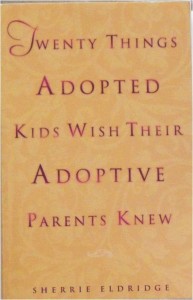 Twenty Things Adopted Kids Wish Their Adoptive Parents Knew
Twenty Things Adopted Kids Wish Their Adoptive Parents Knew by Sherrie Eldridge ““ An essential book in the adoptive family’s library. Written by an adoptee, it provides a broad sweep of the issues adoptees face. With this awareness parents can provide the emotional context their children need to develop healthy attachments and to reconcile the challenges of being adopted. It is never too early or too late to read this book. A gem.
 The Adoptive & Foster Parent Guide
The Adoptive & Foster Parent Guide
The Adoptive & Foster Parent Guide: How to Heal Your Child’s Trauma and Loss by Carol Lozier, LCSW The book is written in a straight-forward style that is practical and easy to understand. Because it is compact, overwhelmed parents can read it quickly and put the suggestions to work immediately.
Carol writes in a manner that is informative, compassionate, and encouraging. She understands that adoptive parenting is different from bio-parenting and requires adoption-appropriate techniques. She shares tools that parents can use to educate themselves, family and friends. This helps to create a team that supports the family instead of critics who sit in judgment. Carol Lozier’s book is practical and insightful.
 Adopting the Hurt Child
Adopting the Hurt Child
Adopting the Hurt Child: Hope for Families with Special-Needs Kids A Guide for Parents and Professionals by Gregory Keck and Regina Kupecky; 1995 by Gregory C. Keck and Regina M. Kupecky; Pinon Press ““ For those who have adopted special needs children, this book is helpful in its realistic portrayal of the challenges and also the hope and opportunity in parenting children who have been hurt. I appreciated the vingettes interspersed throughout the book that helped illustrate the concepts that Keck and Kupecky were discussing. This book also includes a chapter on intercountry adoption, which we found helpful.
 I Choose
I Choose
Children enjoy being able to decide things for themselves. As parents we often make the bulk of the decisions in our children’s lives. Most of us understand that decision making is a skill. Like all skills, mastery only comes through practice. Long before kids become proficient decision makers, they will plod through many errors in judgment. As parents, we face a learning curve too”“when is it “safe” for kids to make a choice and when must the decision fall on our shoulders? Read more
Adoption & the Jewish Family
Adoption & the Jewish Family by Shelley Krapnek Rosenberg ““
This book addresses some of the unique issues that Jewish families face when adopting.
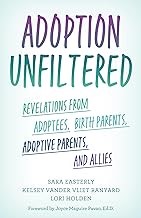 Adoption Unfiltered is a ground-breaking book that examines adoption from the lived experience of an adult adoptee, a birth mother, and an adoptive mother. Poignant, eye-opening, and a must-read for all shaped by adoption.
Adoption Unfiltered is a ground-breaking book that examines adoption from the lived experience of an adult adoptee, a birth mother, and an adoptive mother. Poignant, eye-opening, and a must-read for all shaped by adoption.
 Being Adopted
Being Adopted
by David Brodzinsky Ph. D., Marshall D. Schechter M.D. And Robin Marantz Henig ““ This book covers all stages of development, infancy through adulthood, of the adoptee. The authors use stories from their patients and surveys to illustrate the 6 major themes of their book; life from the adoptees perspective, how the adoptee feels about being adopted changes throughout their developmental stages, giving the adoptee a sense of normal, creating individuality as there is no right way to experience adoption, search for self when a part of them has been cut out of their life and the adoptees sense of loss. I appreciated how the authors tied the scientific evidence to life through the adoptees experiences.
The Blessing of a B Minus: Using Jewish Teachings to Raise Resilient Teenagers by Wendy Mogel ““ Similar in nature and follow up to Wendy Mogel’s first book and looks at the blessings of raising teens and some of the issues today’s parents face and practical advice for dealing with them. Although rooted in Jewish precepts, I agree that Mogel’s compassion and authenticity will ring true with parents of all faiths facing the tumultuous teen years.”
The Blessing Of A Skinned Knee: Using Jewish Teachings to Raise Self-Reliant Children by Wendy Mogel ““ Although not particularly about adoption, this book is a guide to parenting and supports a coaching model in that we cannot, nor should we save our children from experiences from which they can grow to be self-reliant, compassionate and ethical children. Draws on the wisdom of the Torah, the Talmud, and other Jewish teachings and employs the framework of nine “blessings” to address key parenting issues such as respect for adults, chores, keeping expectations in line with your child’s temperament, avoiding over scheduling and overindulgence, and more.
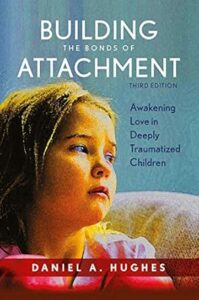 uilding the Bonds of Attachment: Awakening Love in Deeply Troubled Children
uilding the Bonds of Attachment: Awakening Love in Deeply Troubled Children by Daniel A. Hughes ““ Looks at, through the experience of one child how attachment can occur, even at a later date in a child’s life. Attachment only worked by using a technique called “The Attitude” (its five qualities include being accepted, curious, empathetic, loving and playful) and by creating strong boundaries.
 The Connected Child
The Connected Child
The Connected Child: Bring Hope and Healing to Your Adopted Family A brilliant book filled with strategies to assist adoptive families. Dr. Karen Purvis is the Director of the Institute of Child Development at Texas Christian University (TCU) in Fort Worth, Texas. Her work focuses on building and strengthening relationships.
 The Eye of Adoption
The Eye of Adoption
The Eye of Adoption by Jody Dyer Jody Cantrell Dyer writes from the heart with integrity, honesty, humor, compassion, and a commitment to guide others who wait for “their” child to arrive through private agency adoption. She offers her experience as encouragement as they too, work through the arduous pre-adoptive process. When adopting, a baby doesn’t arrive after a nine-month wait; sometimes the matching process takes many years.
Jody’s story gives an inside view of how one person successfully navigated the journey. Waiting parents will find Eye of Adoption an excellent read. They will also want to read widely on how to prepare and educate themselves for the unique task of living as an adoptive family.
 How It Feels to Be Adopted
How It Feels to Be Adopted
How It Feels to Be Adopted by Jill Krementz, 1982 by Jill Krementz; Alfred Knopf, Inc. ““ This book is smaller than Sacred Connections but similar in its structure of telling the stories of adoption, this time exclusively from the children’s viewpoints, ages ranging from eight to sixteen years old and from various backgrounds. It’s an honest book that provides great conversation starters for children as well as letting them know they are not alone in the adoption experience.
 In On It: What Adoptive Parents Would Like You To Know About Adoption. A Guide for Relatives and Friends
In On It: What Adoptive Parents Would Like You To Know About Adoption. A Guide for Relatives and Friends by Elizabeth O’Toole
Let’s Talk About It: Adoption (Mr. Rogers)
by Fred Rogers (“Mr. Rogers”); 1994 by Family Communications Inc.; Penguin Putnam Books for Young Readers ““ Mr. Rogers of Mr. Rogers’ Neighborhood does an excellent job of describing adoption, giving equal weight to the need of the child and the need of adults to be parents. The pictures are diverse, offering different ethnic backgrounds of both the child and the parents. It’s an easy, short read and a great book for children of pre-school and grade school ages. Our kids had us read it together over and over again.

The Newbies Guide to Positive Parenting
Although not specifically directed at adoptive families, “The Newbies Guide to Positive Parenting” definitely concentrates on sustaining connection, on parenting via modeling the attitudes and behaviors parents want their children to learn. Rebecca asserts an important distinction: “leading and controlling are very different.” One invites cooperation; the other invites rebellion. One is respect-based; the other is fear-based.
Here are a few memorable quotes from the book:
- “Positive discipline isn’t about making a child pay for his mistake but rather learn from it”
- “It’s about teaching them to do what is right instead of punishing them for doing what is wrong.”
- “There is no such thing as an unimportant day when you are shaping a child’s life”¦Be intentional about what it is you are writing.”

No Matter What by Sally Donovan Yes, love heals but parenting kids with trauma/neglect histories, requires so much more. Immerse yourself in this story of the fierce love of this adoptive family. Understand the day to day challenges as these children learn to deal with and heal from their past. Cheer on these parents as they are called on to muster every ounce of patience, determination, and hope while they discover what their kids need emotionally, academically, and socially and then work to provide it. Experience the heroism of both kids and parents who must confront the aftermath of abuse, learn to cope with and channel the anger, shame, and grief. This story will break your heart wide open, expand your understanding of the life-long impact of abuse and neglect and educate you on how to be a better, friend, teacher, family member, and perhaps call you to rise to the challenge of parenting kids with “tough starts.” At the very least, it will open your eyes and hearts and draw you in to view adoptive families with more empathy and less judgment. This is not a happily-ever-after tale but a true portrait of what it takes as a family to overcome such a disastrous beginning and to triumph.

One for the Murphys by Lynda Mullaly Hunt
Get ready for a rollicking ride on an emotional roller coaster. One for the Murphys by Lynda Mullaly Hunt will make you laugh and weep as you follow Carly Conner’s journey through foster care. She’s a sassy, resilient survivor shaped by her single mom’s inconsistent parenting. Carly never knows what to expect: her mom’s whacked-out version of nurturing or neglect. When a violent stepdad enters the picture, home life deteriorates from inadequate to life-threatening.
Carly enters foster care with the Murphys. Life becomes more complicated than ever as Carly experiences what it feels like to have a mom that knows how to love unconditionally and who enjoys caring for her children. The contrast between her two families becomes apparent to Carly. Now that she’s experienced a calm, loving family home, she wants that for herself too. Carly must face a gut-wrenching decision””deciding whose daughter she wants to be.
In Carly, Lynda Mullaly Hunt has created an unforgettable character that will grab your heart and leave an indelible mark on your memory. A truly exceptional read.

The Open-hearted Way to Open Adoption
Questions abound in the minds of prospective adopters as well as expectant parents contemplating adoption for their unborn child. (Do we need a contract? Is it enforceable? Desirable? Isn’t open adoption confusing for the child?) These and many more issues are addressed in The Open-hearted Way to Open Adoption by Lori Holden and Crystal Hass. They are the adoptive mother and birthmother who have an open adoption relationship.

 Parenting Adopted Adolescents
Parenting Adopted Adolescents
Parenting Adopted Adolescents: Understanding and Appreciating Their Journeys by Gregory C Keck ““ A hopeful message that acknowledges and understands teen behavior as a regular developmental pattern and then gives parents tools for handling the behavior in light of new understanding of the behavior. It is all about relationship!
 Pieces of Me
Pieces of Me
Pieces of Me: Who do I Want to Be by L. Ballard, editor, EMK A series of essays written by adoptees. They face the same identity issues of all teenagers with the added complication of adoption themes. Well written in a way that addresses difficult topics without sugar-coating or catastrophizing. A heartfelt exploration that might provide a much-needed sense of common experience to a teenage adoptee and several possible roadmaps that could inform their own adoption journey.
 The Primal Wound
The Primal Wound
The Primal Wound: Understanding the Adopted Child by Nancy Newton Verrier ““ A wound exists when a child is separated from his/her mother. The Primal Wound explains how this wound came to be and how it manifests itself in various ways throughout the developmental stages. The book provides solutions to facilitate healing the wound for different age groups and in different situations. This book validates the existence of the Primal Wound and offers great insight to behaviors caused by it.
The solutions are extremely helpful for any adoptive parent.
 Raising Adopted Children
Raising Adopted Children
Raising Adopted Children, Revised Edition: Practical Reassuring Advice for Every Adoptive Parent
by Lois Melina ““ An updated version that is comprehensive in covering adoption issues and a good resource book to have on hand.
 Sacred Connections
Sacred Connections
Sacred Connections: Stories Of Adoption, essays by Mary Ann Koenig and Photography by Niki Berg; 2000 by Mary Ann Koenig; Running Press Book Publishers ““ Mary Ann Koenig, a clinical psychologist and herself an adoptee, interviews those connected through adoption. The stories are real, touching, and span the various experiences of adoption: some who find their birth parents and some who do not, some who are excited about the reunion, and some who are disappointed, birth parents who are have searched for their children, etc. My adolescent son has read this book with me several times. Each night, we would take one story and read it, looking closely at the pictures. As the title suggests, the book honors all connections and this is evident in how carefully and candidly the stories are told. I highly recommend this book as a bridge to discussions with your adolescent about adoption.

Scattered Links
Scattered Links by M. Weidenbenner connected with me in many ways. First, the story is exceptionally written. Second, As an adoptive mother and a coach to adoptive families, the story had authenticity. Page after page, I ached for Oksana, the twelve-year-old heroine, for the sad reality that was/is her life and that of many other orphanage-raised, severely traumatized children who fear to trust and open themselves to attachment. The emotional struggles portrayed ring true for both Oksana and her adoptive parents. As an adoption professional, I do have one criticism of this wonderful book. The celebration of Oksana’s joining her adoptive family is called “Gotcha Day.” This is a term many adoptees find offensive. It is seen as depersonalizing and parent-centric because it casts the child as acquired by the parents. The bottom line of this review: Adoptees are not the only ones with emotional baggage. Adoptive parents also bring their own”¦
 Seven Core Issues in Adoption and Permanency: A Comprehensive Guide to Promoting Understanding and Healing In Adoption, Foster Care, Kinship Families and Third Party Reproduction This book is foundational to adoptive parenting. It explores some of the fundamental challenges that adoptees and their families face. Awareness is the first step to understanding what support adoptees need as they strive to understand what is means to be adopted.
Seven Core Issues in Adoption and Permanency: A Comprehensive Guide to Promoting Understanding and Healing In Adoption, Foster Care, Kinship Families and Third Party Reproduction This book is foundational to adoptive parenting. It explores some of the fundamental challenges that adoptees and their families face. Awareness is the first step to understanding what support adoptees need as they strive to understand what is means to be adopted.
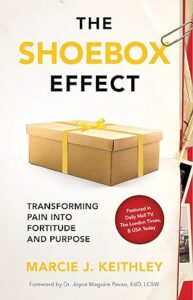 The Shoebox Effect : Transforming Pain into Fortitude and Purpose
The Shoebox Effect : Transforming Pain into Fortitude and Purpose
Many of us have one–a place where we store mementos that remind us of an earlier period in our lives–either happy or sad. Those ties to our past are commonly found in a similar place, hidden in a shoebox buried at the back of a closet shelf. It’s called The Shoebox Effect–where you “forget”, intentionally or unintentionally, about the contents of the box and what they represent. Marcie Keithley’s shoebox contained a secret, one she kept for decades, one released when her shoebox was unexpectedly revealed in a moment of grief. A flood of memories and emotions were unleashed when the lid was knocked off. No longer able to deny what she had sequestered away in her closet and in her spirit, the revelation created challenges for Marcie, but it also did something positively unexpected. Releasing the truth began a cascade that resulted in a freedom Marcie did not know was possible.
 The Tell
The Tell
The Tell: A Memoir Heartbreaking, honest. A mother shares her family’s worst nightmare. It is both an immensely cautionary tale and a story of family commitment. This is a book you will never forget. The Tell: A Memoir by Mags Karn chronicles a family walking through the unspeakable horror of sexual abuse perpetrated by one child against his sisters.
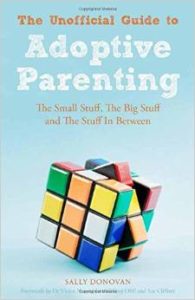 The Unofficial Guide to Adoptive Parenting
The Unofficial Guide to Adoptive Parenting
The Unofficial Guide to Adoptive Parenting by Sally Donovan is a welcome contribution to the reality of adoptive parenting. She knows what it is like to live in the “Polar Vortex” of parenting. She has faced her fill of platitudes, criticism, and rude questions. Reading her book is like finally finding a friend her really “gets” the journey of parenting traumatized kids. Sally has some practical ideas as well as incisive commentary that will make readers laugh as well as cry.
Read it for her great”“and practical”“suggestions and for the experience and encouragement of “visiting” with a kindred spirit.
 Who Is A Worthy Mother
Who Is A Worthy Mother
In the title of her excellent book, Rebecca Wellington asks a pivotal question: Who is a worthy mother? Her well-documented research spotlights factors that usually remain unacknowledged or dismissed. The history of the policies, beliefs, judgments and decisions determining which women are deemed entitled to parent their children reveal that they were based on a narrow and biased lens. Little or no attention was given to the cultural norms and traditions of non-northern Europeans. Her analysis shows that often the desire to convert children and “civilize” them in ways that erased their cultures, family connections, and traditions often held a higher priority than their welfare.
The calculus of the “costs”/benefits that adoption confer on a child was entrenched in a viewpoint of adoption as totally benign. It disregarded the life-long trauma to both birth mothers and adoptees and minimized the intense losses and grief they experienced.
But of course, those losses are far from trivial. Our support systems for and analysis of mothers’ worthiness need a substantive overhaul. We must prioritize the needs of mothers and their children over the yearnings and needs of prospective adoptive parents. This book provides a much-needed historical perspective that exposes many uncomfortable truths about the motivations, policies, and practices that have shaped our cultural thoughts and beliefs about adoption, birth mothers and adoptees. Everyone connected to adoption should read it.
Why Love Matters
Why Love Matters: How Affection Shapes a Baby’s Brain, by Sue Gerhardt ““ Explains why love is essential to a baby’s development & how this starts very early on”¦ even in the womb & has lasting effects on the infant.

You Don’t Look Adopted
We parents often lament that children do not come with a handbook. That’s why You Don’t Look Adopted is the next best thing. Please read Anne’s responses; she has a great deal of insight to share with us. It is a raw, unflinching look at adoption through an adult adoptee’s experiences. Her story will inspire parents who are currently raising children to create the spaces, open the conversations, and help support their kiddos through the adoption-related stresses and fallout. This is an exceptional book that is well worth the read.
 Yushi and the Tall Man
Yushi and the Tall Man
Yushi and the Tall Man by Tami Staut ““ A children’s (pre-school and elementary school) book about adopting a Chinese baby. This is a great children’s book to open discussions about adoption, and Chinese baby girl adoptions in particular. The story follows what happens to most Chinese baby girls who are abandoned in China, and has a happy ending with a forever family. The illustrations are wonderful and calming.
This book was written by my friend Tami Staut and is about and for my friends, the Jones family, when they adopted their baby Chinese girl, now named Elizabeth.
 Forever Fingerprints
Forever Fingerprints
The wonderful adoption classic, Forever Fingerprints by Sherrie Eldridge is being reissued by Jessica Kingsley Publishers. An adoptee and a staunch advocate for adoptive families writes, who LIVES the adoption journey, Sherrie connects with adoptees’ hearts and validates their experience. She has written many books about the adoption experience. Forever Fingerprints, a picture book serves a younger audience than Sherrie’s other books.
Behind its simple storyline, Forever Fingerprints models adoption-attuned* relationships. It speaks to the child and parents. As an adoption coach as well as an adoptive parent, I know it is important for parents to clearly establish that adoption is a suitable topic for family discussion. While this may seem obvious, to children it is not. In the absence of expressed permission, kids will assume that adoption conversations are off-limits. They will fear that it might hurt their (adoptive) parents if they talk about their concerns, mixed feelings, and sharing their thoughts about their birth parents. And so, many wrestle with heavy worries weighing down their hearts. Forever Fingerprints is an easy and enjoyable way for parents to talk about some of the “hard stuff” of adoption.
Help A Hamster
Help A Hamster by Hilary Robinson (Picture book for children) Meet Alphie, his classmates, and their pet hamster, Henry. Turns out, Henry is a she who recently delivered a litter. Taking care of all those babies overwhelms Henry so Alphie and his friends search for safe, loving homes for the babies. They appoint Alphie hamster monitor. Alphie, an adoptee, sees the parallels in his own story and works hard to find homes where each of the hamsters will be happy.
This book includes information about adoption that is presented in a gentle and subtle tone. It will offer many teachable moments for kids to learn about adoption whether they are adopted themselves or not. The illustrations by Mandy Stanley are lovely, engaging, and inclusive. As in real life, families come in different shapes and sizes. “Help a Hamster” is an excellent addition to the family library.
The Road to Paris
The Road to Paris (Coretta Scott King Author Honor Books) by Nikki Grimes ““ Paris is a person, not a place. This is the story of her journey as a frightened eight-year-old girl placed into foster care. Protective of her mischievous little brother, she is resilient and resourceful. This book follows Paris and her younger brother through many placements. After the children are separated, Paris struggles to stay connected. She is finally comfortable in a supportive foster home. Then her final challenge comes: rejoining her mother and brother discovering what it means to be family.
 As Simple As It Seems
As Simple As It Seems
by Sarah Weeks. Directed toward late elementary and middle-school ““ Highlights the impact of a fifth-grade girl learning she is adopted. Deals with the powerful questions of nature vs. nurture as the protagonist discovers how the behavior of biological parents may or may not inform her own choices and character. An outstanding book.
A Memoir of Foster Parenting and Beyond by Deborah Gold “Counting Down is a deeply moving memoir about both the reward and daunting challenges of being a foster family.” Deborah Gold incorporates both parent and child perspectives creating a unique and valuable perspective on fostering. A great read for anyone even if not a foster or adoptive parent.
The Strangely Hopeful Story of Foster Care and Adoption in Appalachia by Wendy Welch “Fall or Fly is a compelling, unvarnished glimpse into the complex world of foster care and adoption in modern-day Appalachia. Dr. Welch provides readers with a multifaceted view of the system through the eyes of children, foster parents, and caseworkers “¦ offering a more complete understanding of the foster care system.”
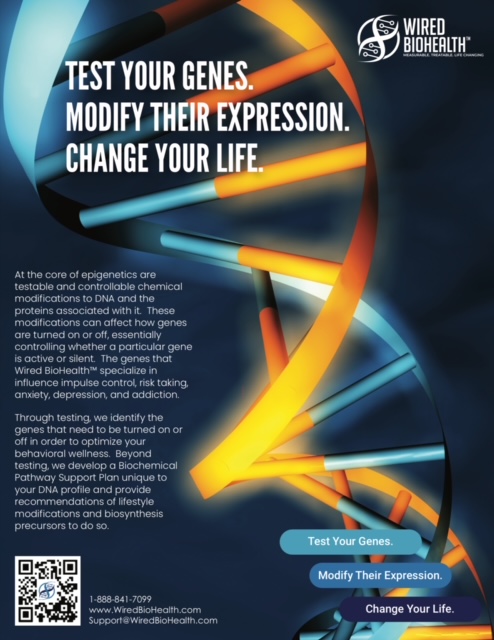
Presents a featured resource to support adopted families
Scroll beyond the recommended book list to learn more!
While genes play a 10-33% role in our physical health, they can play up to a 50% role in our mental health. For those in the DCP, NPE, and adoption communities, being separated from lineage can present challenges when it comes to understanding the biology behind your behavioral wellness. Wired BioHealthâ„¢ takes a deep dive into 85 specific biomarkers highly correlated to mental health conditions, substance use disorders, and process addictions.
Having objective data of the DNA influencing your thoughts, feelings, and behaviors can provide a better understanding of self, but also inform a support plan designed to optimize your unique biology. Objective biomarkers reduce shame, confusion, and misunderstanding when it comes to behavioral wellness. Once we measure the biomarkers that require support, a biochemical pathway support plan can be designed to optimize the DNA you were born with. Wired BioHealthâ„¢ is committed to supporting DCP, NPE, and adoption communities through our epigenetic and neuroscience testing. We look forward to supporting you in your wellness journey.
